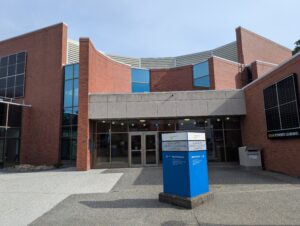While many services are blocked by pricey monthly subscriptions, perhaps the most useful resource to Camosun students is right here on campus, with no charge attached: the library.
The utility of the space goes beyond books and easy-to-access desktop computers. But the full range of resources—which currently includes access to a 3D printer and podcast room through the college’s Makerspace—remains an unfortunate mystery to many students. Material benefits aside, however, perhaps the greatest service the library offers is access to the staff’s knowledge.
Michelle Beasley has been a library assistant at Camosun for the past year, after a decade of service at a public library. She works front end, as the first point of contact for students. Along with other library assistants, she checks books in and out, refers students to research departments, and gives out information on bus passes, among other duties.

“I have my degree in creative writing,” says Beasley. “So, I wanted to be a writer. I also studied philosophy. But then I saw there was a job at the book library and I loved it. I love books and I love talking to people about books and I love recommending books to people. I love talking to people. I’m social by nature.”
Beasley is quick to stress that she’s not a librarian. Accredited institutions, like colleges and universities, demand a minimum master’s level in library sciences or library and information sciences before entering the profession.
Patricia Scott has been a librarian at Camosun for over 10 years. Currently, she works as a positions librarian, meaning that she, with a technician, acquires all the print materials that the library purchases. Scott specializes in certain research areas including criminology, political sciences, and psychology, and goes into classrooms to instruct students on how to use the library databases, print and digital.
“I just have always enjoyed organizing things and I enjoy information, searching for information, and research,” says Scott. “It was kind of a little bit of process of elimination, honestly. I finished my undergrad and I was starting to have a family. And I wanted something professional, and it was interesting. As I look back on my history of work, I’ve often been in libraries.”
As a librarian, Scott works with knowledge-hungry people who aren’t necessarily trained in research. She uses a series of questions to help students find the information they need.
“Very quickly, depending on the questions, you can narrow [down the search],” she says. “So, I enjoy that part and when you find that gem of an article, you can tell when their eyes brighten and they say, ‘That’s what I’m looking for.’ I enjoy helping people find what they’re looking for.”
As censorship controversies surrounding libraries in the US ramp up, Scott is steadfast in her commitment to literary freedom.
“As a librarian, my first and foremost value is freedom of information and access to information… that people have access to the information that they’re looking for and that they want to find… that we provide that for them and that different points of view are represented,” says Scott. “There’s sometimes a saying: there’s something in the library to offend everyone. I hold that dear to my heart.”

